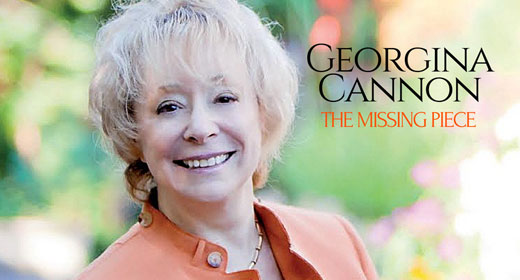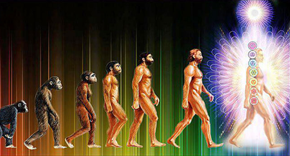By Liane Buck: An award-winning author, Dr. Georgina Cannon is a change catalyst, corporate speaker, international facilitator,

and practicing consulting hypnotist who brilliantly and skillfully uncovers the powers of the subconscious mind-body connection working through relationship and life issues with clients both personally and for business.
With an eclectic background in journalism, the corporate world, and counseling, Georgina Cannon is a powerful catalyst for change – in a person, a couple, or a corporation/organization.
Writing, teaching, lecturing and appearing in the media, she attracts audiences both young and old, including the 78 million baby boomers in North America looking forward to the second half of their lives and seeking insight and inspiration on life’s deepest questions.
Georgina Cannon is an award-winning, board-certified, master consulting hypnotist and in 1997 founded the Ontario Hypnosis Centre, which within a few years became Canada’s leading hypnosis training facility and clinic. She has since sold the OHC to focus on her writing, lecturing and client work. An accredited life coach, she is recognized as the public face of hypnosis and the mind-body connection in Canada and is a respected member of the complementary health community. Georgina is a regular guest on national and international television and radio programs and her work has gained her prominence as a source for news and feature articles on hypnosis, counseling, and complementary therapies. Her work and extraordinary commitment have been recognized internationally.
OMTIMES: Why did you write The Third Circle Protocol – how did the idea start?
Georgina Cannon: About eight years ago, Robert came into my clinic office looking for help with anger management. He had inherited his parents’ business 18 months prior and discovered a temper that he didn’t know he had. The trigger for his newly discovered anger was the bookkeeper, Helen, who he had inherited as part of the business. She had been there since it opened and had known Robert since he was four-years-old and seemingly treated him that way. “Every time I hold a staff meeting, and I want to bring forward new customer relationship protocols, she argues with me. Reminding me that the way my parents did it has worked well, so why change it. I feel she diminishes me in front of the staff and I get angry. The same thing happens every time. I apologized later, and the following day she brings me cookies to say sorry. I don’t want her damn cookies!” He stamped his foot and banged the desk as he said that – and looked just like a four-year-old having a tantrum. What I saw at that moment was a snapshot of what Helen saw in her mind – her boss as a 4-year-old kid, son of the original owners of the business.
At that moment, the concept of The Third Circle Protocol was born. I saw it very clearly; the unspoken expectations we have of each other. We always take snapshots of everyone we have a relationship with, and we expect them to behave according to our snapshot. The clerk at the check-out counter, our long-time friend or lover, our work colleagues and most of all our family. By doing this, we are removing the humanity of our interaction with the expectations of consistent performance. The husband who claims his wife has changed since he married her, the parent who complains about a teenager’s behavior or the distancing of a family member for seemingly no reason. The question of “why are they doing this to me?” avoids the reality of others being whole human beings who evolve and change the same and in different ways we do. If not, we’d still be crawling on the floor in diapers!
As I started working with Robert on both his snapshot version of himself and Helen, the concept of The Third Circle Protocol unfolded – one that allowed new rules and boundaries for a brand-new relationship. We examined expectations, at that time unwritten or unsaid – the unspoken contract of assumptions. We looked at the life values that were important to Robert, his priorities and what he needed in his relationship with Helen – and all his employees. Along the way, we added what he would like to have in his employee relationships as well as what he needed. And then, what was he prepared to give to the relationships with his employees – apart of course from the salary and benefits in their employee contracts.
OMTIMES: You write in your book about contracts, spoken and unspoken, can you explain that?
Georgina Cannon: Whether we acknowledge it or not, we are in a relationship every moment of every day. The people we live with, the person at the gas station, our boss, our dentist or doctor, the sales clerk and even ourselves. And let’s take it even further; the people who enable us to have running water from the tap, lights on when we flick a switch and the techie when our computer crashes. (oops!)
What breaks relationships apart – the missing piece if you will – is the unspoken and unwritten expectations or mind contracts, we carry with us. Plus, there are previous patterns of bullying or victimhood, either as learned behavior in this life or from a previous life or experience. With the relationships, we choose in life, our friends, lovers, work colleagues, I believe that we spend more time choosing a flavor of ice-cream than we give to how we start, build and live in relationships!
OMTIMES: So, what exactly is that mind contract, or the Third Circle?
Georgina Cannon: So, there’s the first circle YOU, the second circle ME and the third circle THE RELATIONSHIP. As Dr. Bernie Siegel commented on reading the book, “The Third Circle Protocol speaks the truth. One plus one equals three. The third entity is the relationship which two people create”. The relationship itself consists of the unspoken contract – and with the protocol, that unspoken contract becomes spoken.
• Your life values – the rock on which you stand • Your priorities – for the next 6 – 12 months • Your absolute needs in every relationship – including with yourself 4 – 5 needs • Your wants – or nice to have’s • What are you prepared to give into the relationship to keep it vibrant, healthy and strong?
OMTimes: What are the most common relationship problems and how easy is it to solve them?
Georgina Cannon: Most problems start with expectations not met. Often operating from the snapshot we’ve made of others, what they used to be, or should be. A partner who ‘should’ know what we’re thinking, a teen who is becoming ‘uppity,’ a doctor or lawyer we feel is dismissive. We feel let down, unrecognized and sometimes angry. All well-choreographed relationships have the same basis – a strong relationship with ourselves starting with living our values, knowing our priorities and what we want and need in all life relationships. We start with the relationship we have with ourselves first because we take ourselves everywhere we go.
Since this protocol came alive, I ask every coaching and counseling client to work, often for the first time in his or her lives, on themselves first. Then we move to working on any troubling relationships they have within the family, work or lovers.
As we communicate with our other relationships, we also communicate with our self. Our self-talk is the most important conversation we have every day. We have about 50,000 thoughts a day – 35 or so a minute, and that’s on a slow day! Knowing that what we think about, we bring about, you’d think we’d be more careful about our thoughts and self-talk wouldn’t you? Because the relationship we have with our self is pivotal with how we manage and nurture other relationships. It’s the seed and flower of all relationships – and sometimes those relationships can be thorny.
OMTimes: Are all relationships treated the same way?
Georgina Cannon: Yes and no. As an example, when we’re working with aging parents the dynamics are different. They are used to being in charge and hate the idea of someone – their child in most cases – making decisions for them. This is when you take their values into consideration when making life altering plans for them, and as kindness or consideration is probably one of your values, that shouldn’t be too difficult to work with. When we’re working with the ‘unloved ones’ in our lives – and we all have those. There are different ways of communicating than we have done in the past to make our lives less stressful. I go into this in greater detail in the book.
But basically, if you remember that people like people who are like them; so start looking for similarities, even as basic as gender, hobbies or TV shows and build on that – always using your values of kindness, or open-mindedness, or whatever is important to you.
OMTimes: What kinds of relationships should people avoid?
Georgina Cannon: Any that diminish us or belittle your value system. As an example, if one of your 4 or 5 needs in your relationship contract with yourself is to be heard, and your boss, lover or friend talks over you all the time or ignores your need to be heard. It’s time to re-evaluate that relationship and maybe leave it behind.
OMTimes: In your best-selling book Return – How to Find Meaning in Your Past Lives and Your Interlives, you describe how understanding our past, and past lives can improve our futures. Could you explain that?
Georgina Cannon: With pleasure! I believe we live in patterns – how we hold our mug of coffee, how we walk, how we talk, how we react to certain stimulations (Hi Robert!) who we like, who we love and who we are attracted to, or not. Some of these patterns are taught to us, mostly unknowingly, in early childhood – what is called learned behavior. Some seem to come to us through genetics (you walk like your grandfather although you never met him) and others come to us from a past lifetime. The latter, we sometimes call Karma.
I believe that our Karma is like a hand of cards we are given. It is up to us how we play them. So, if you live in a pattern of victimhood for instance, once you realize that, you can change it.
You can choose to become a hero in your life instead of a victim. The Third Circle Protocol works brilliantly with this type of change need because it brings to the foreground all the assumptions we have been living with. And once we know what they are, we can work to change them.
OMTimes: Any final words to our readers?
Georgina Cannon: After working with clients for over 20 years, I know this to be true. How we interact with others in relationships, is totally based on how we interact with our self. Many relationships in life are messy – particularly family relationships. Many work well enough to be enjoyable or efficient.
Some, truly, are not worth the energy. You get to choose. You get to choose who and how you are, through your values, priorities, needs, wants and gives. So, it is with all your relationships. That’s the secret. That’s the missing piece.









































